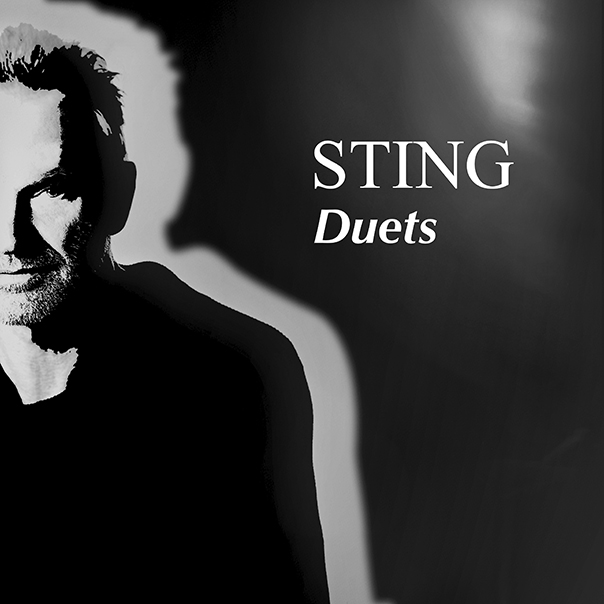ALBUM REVIEW: Sting brings out the best in his guests on ‘Duets’

Sting, “Duets.”
At 69 years of age and over 7 million monthly listeners on Spotify, English musician Sting would appear to have a fair amount of pull in the music industry. A look at the guest performers on his new compilation album, Duets, confirms the distinctive vocalist’s tenured clout as a musician’s musician.
Duets
Sting
Cherrytree, March 19
8/10
Duets covers roughly the past 20 years, exclusively focusing on Sting’s work with other major recording artists. During this period, hit songs were a rarity for Sting, but collaborations were frequent and fruitful. Duets nicely places more adventurous, obscure material alongside successful singles and unit shifters. Sting ventures into jazz, soul and international beats, highlighting lesser-known talents like Algerian raï artist Cheb Mami on “Desert Rose.” This sits alongside “Don’t Make Me Wait,” a song from his 2018 joint album with Shaggy, 44/876, a record which revitalized both artists’ sales.
It’s not within the scope of Duets to present a particular musical direction or storytelling arc. The anthology is certainly no concept album, nor does it attempt to work from a theorem or happenstance to explore a particular mood or atmosphere. Instead it offers a collection of carefully cultivated pop vocal performances. As such, the songs should be appreciated individually as singular works.
The record succeeds in emphasizing collaborative magic over star power. More under-the-radar artists like Melody Gardot and Mylène Farmer appear early in the running order, while heavy hitters like Annie Lennox and Shaggy emerge in the middle of the album. The songs on Duets cannot easily be categorized as belonging wholly to Sting. Each takes on a life of its own, and infuses the character of its guest performer.
This emphasis on channeling charismatic and lionized performers of the past half-century brings real joy to the proceedings. Highlight “None Of Us Are Free” boasts a powerful vocal from the legendary Sam Moore of Sam & Dave fame. The weary but determined blues vibe of the song also provides a reprieve from the collection’s tendency toward driving, modern beats.
Similarly, the undeniable Mary J. Blige oozes exuberance on “Whenever I Say Your Name.” Both Blige and Sting take the opportunity to play to their strengths. Sting begins the tune with a characteristically moody, subtle verse. Imperceptibly, the song morphs into a borderline funk romp, pushing Blige’s power vocals to the fore.
Though vocalists are emphasized, a handful of guests make their contributions instrumentally. Jazz trumpeter Chris Botti pops up on the closing track. Sting dusts off show-tune “My Funny Valentine” with a tasteful contribution from one of the greats, Herbie Hancock. On the smoky “It’s Probably Me,” a duet for voice and electric guitar, rock legend Eric Clapton appears providing restrained blues licks and evocative phrasings. Nominated for a Grammy in 1993, “It’s Probably Me” perfectly captures Sting’s bourgeois-hippie appeal. Baroque scales and acoustic instruments echo like a chamber performance at some shadowy vineyard.
Elsewhere, Sting makes songs better by hanging back to swell the progress. Sleeper “Practical Arrangement” works well as a film-musical plot piece. Guest vocalist Jo Lawry channels the hard-won convictions of the female lead. Through back and forth conversational lyrics, Lawry and Sting highlight the difficulty of embarking on a mutually committed journey. Sting’s character asks for responsibility and trust, but is rebuked with penetrating questions. Yet Lawry’s believable treatment of appropriate boundary-setting still carries enough warmth to hint at redemption.
Such organic pithiness underpins the majority of Duets’ songs and performances. At a certain point, or for certain listeners, it’s not enough to save the record from its glistening production value. Though no less than we’d expect from Sting at this point, a few songs come across as hookless and overproduced. Sterile dance beats creep in where they aren’t particularly needed.
The strangely cold “September,” for example, wavers between pastoral musing and dance-floor pep. Continental bluesman Zucchero matches the timbre of Sting’s voice in Italian, but a viscous under-beat recurs to interrupt the pretty daydream. “Reste,” with GIMS, feels like a mismatch of vocalists and styles. “Rise And Fall” verges on the painful—Craig David’s cloying, overly busy vocals detract from the aching classical guitar hook borrowed from Ten Summoner’s Tales’ superior song, “Shape Of My Heart.”
However, on the whole, Duets portrays Sting as a conduit for passionate performances. On many of the songs, his contribution is understated and uncertain, serving to push the featured artist forward. Yet the fact that each song is of such polished and refined quality speaks to Sting’s subtle knack for engineering holistic, arty pop songs. Though he sacrifices some amount of the spotlight, the songs, the artists and listeners benefit.
